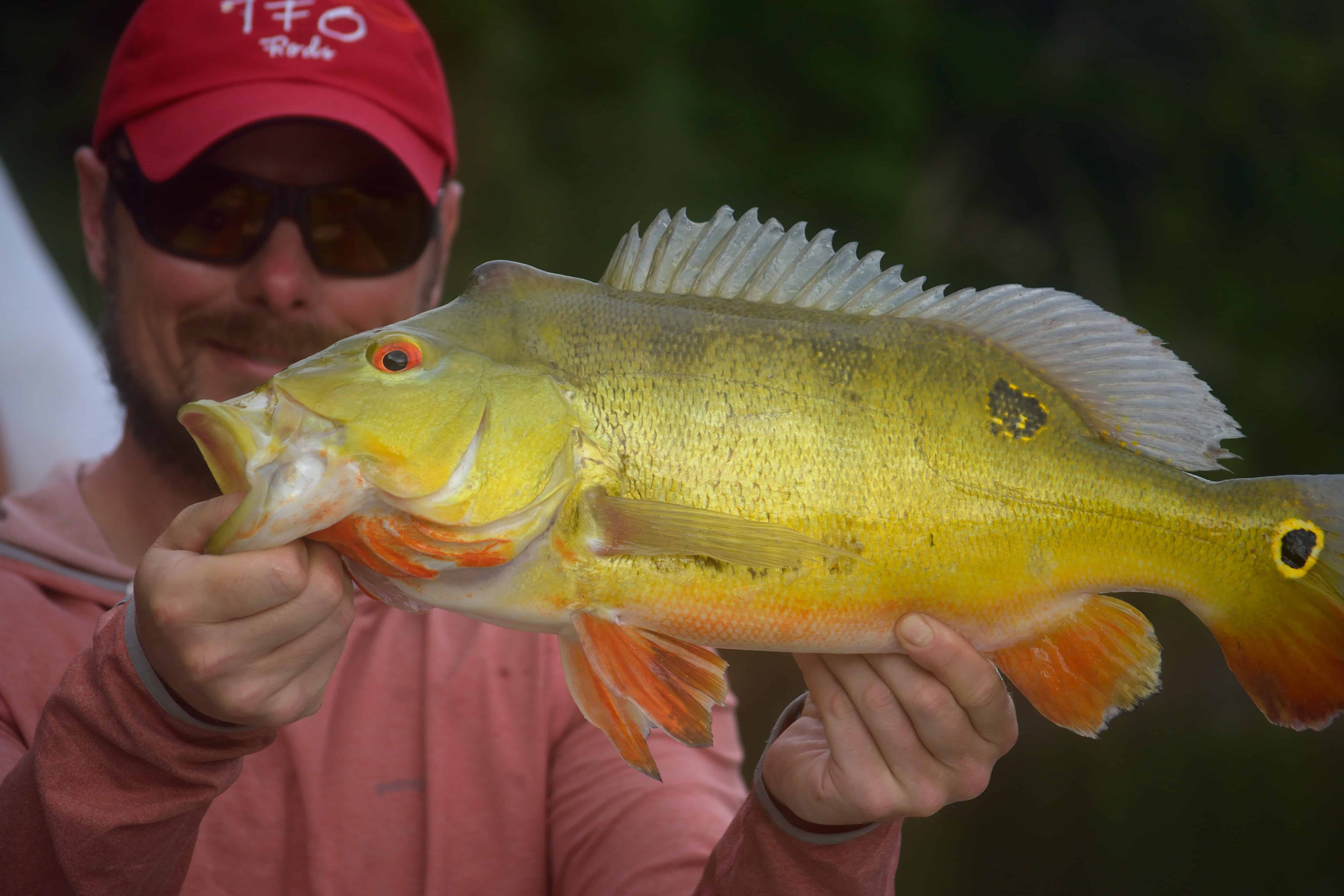To Harvest or Not to Harvest – That is the Question
To harvest your catch or to not harvest your catch? In a culture where catch and release is sacrosanct, proper fish handling procedures lead to arguments, and advocating eating our catch is political suicide, why would that question even pop into my head? Our clients rarely ask to keep fish (except for salmon and I haven’t run any walleye charters so…) so the conversation rarely comes up. Besides, I’m well fed here at home and I make enough money to feed my family from store bought food, so I don’t find myself needing/wanting to keep anything. However, a recent trip to Guyana forced me to think differently about the subject and truly ask myself – why is eating your catch so frowned upon these days?
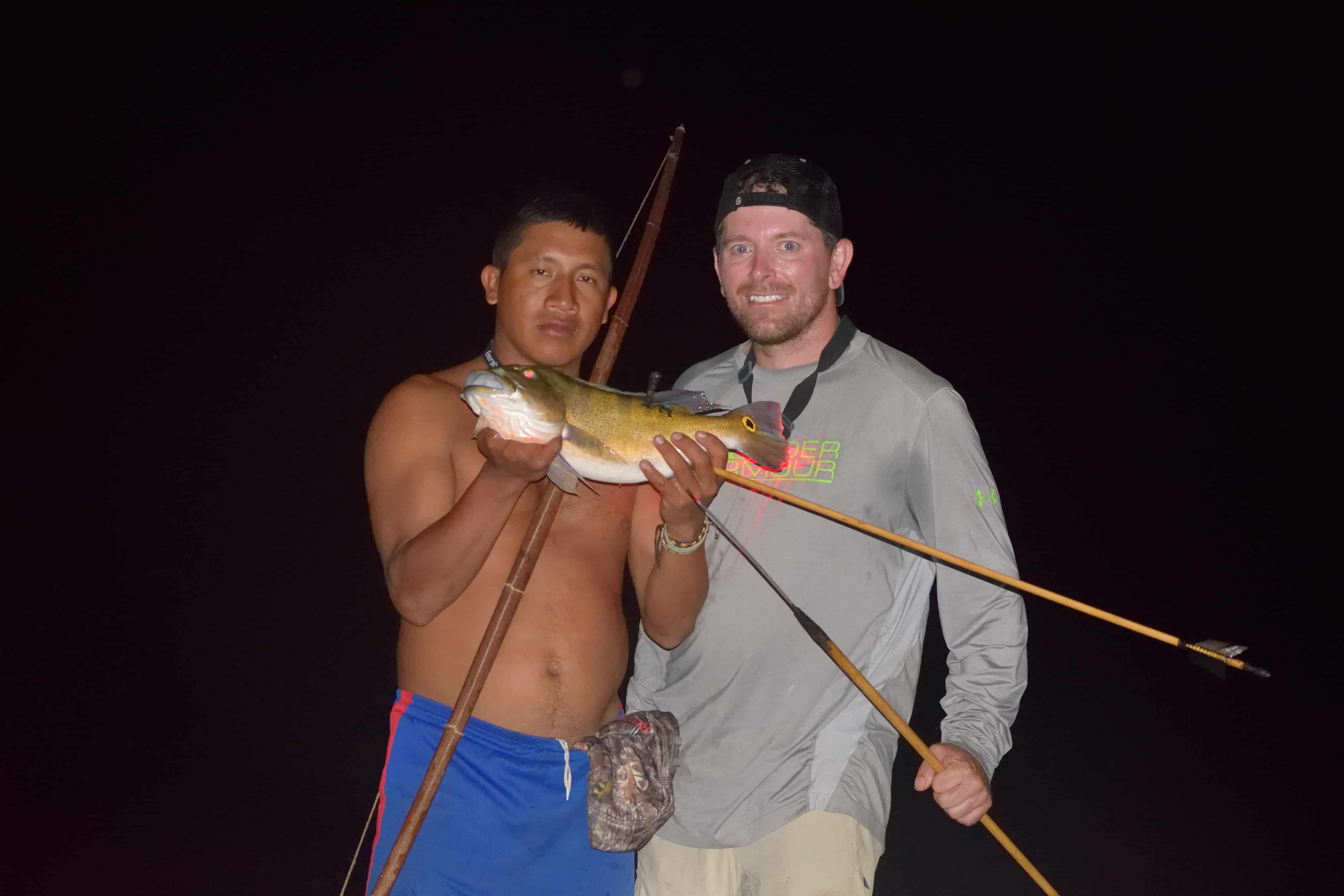
Carlson teaches Mike the skill of bow fishing for Peacock Bass at night. Fried peacock was our morning breakfast

Chuck – one shot, one kill. We would eat well the following morning.
Before I go any further, please allow me to clarify:
1. If that last line of the first paragraph didn’t generate some sort of burst of anger, desire to shout a response, or any other combative urge to make your points heard – this article won’t make much sense to you. This is a sensitive topic for some. If that’s not you, stand by to be confused but read on for some weird insights.
2. I am not advocating the violation of any state and or federal laws that protect our fisheries. For the sake of the argument, I am assuming all state and federal regulations are effective in accomplishing their desired intent. I recognize that assumption is bold to quite bold. However, I am not an expert in the legislative process surrounding the creation/modification/deletion of wildlife regulations so I will not pretend to have an educated position.
3. I am also not advocating maxing out your harvest limits every time you go fishing. It’s everyone’s legal right to do that but I’m not sure a healthy dose of fish from most freshwater fisheries in the U.S. is actually healthy. In other words, why would you bother?
Most Hunters Have it Right
I’ll start off by saying that I am not a patient person. The older generation would say that’s a bad attribute to have if you’re an angler. I would respond that my lack of patience helps me grow and learn as an angler. I’ve fished a ton of different water in my life and still find myself wanting to learn more. Moving around is essential. Trying new techniques is a must. Having fun with others is part of the game. I mention this because sitting all day in a tree stand, waiting to kill something, is something I just can’t do. The boredom would suck the life out of me.
I am by no means knocking the practice of hunting from a tree stand. I admire hunters who have this kind of patience. Moreover, I believe hunters are connected to something primordial in a way that most catch and release proselytizers can’t understand. Worse, refuse to try to understand. It’s hard to judge people who hunt for food from a logical or moral position. The urge to kill and consume prey is what kept our species alive for 10s of thousands of years. If done responsibly in modern times, what’s the problem?
Confusing Morals
What position of moral authority are anti-harvesters coming from? If you had asked me this question prior to going to Guyana (when I was a blind, catch and release advocate) I wouldn’t have had a good response. That’s kind of the party line among fly fisherman and admittedly, I bought in with little to no thought. The natural urge from any catch and release advocate would be to respond with something like, “If everyone regularly and haplessly harvested prey, we would devastate our ecosystems.” That’s probably true, I’m not completely sure (see point #2 above). Either way, as I mentioned earlier, I am not advocating for this type of behavior. I just want to introduce a different way of thinking about fishing and to challenge any purists out there that are willing to think critically about their position on catch and release fishing.
What Happened in Guyana Won’t Stay in Guyana
A few days into our Guyana trip we made a commitment to live off the land – like our Amerindian guides. After all, when would we have another opportunity to eat completely natural/whole foods like that of our pre-historic ancestors? As a guy approaching 40, I’m always experimenting with diets and workout regimens to keep myself young. This kind of paleo diet is exactly what I had been striving for at home. Forcing ourselves into that dietary pattern would be a good experiment. It worked out amazingly.
I won’t bore you with the detailed outcomes of that diet – bottom line, we all lost a good amount of weight and left feeling healthier than we had in a long time. The more interesting phenomenon that emerged was a different kind of connection with our quarry. We didn’t become bloodthirsty animals or anything like that. Quite the contrary – something more human emerged.
The Harvest
You can read a quick bio of the team that went on this trip by clicking here. That background is relevant in that none of us frequently harvest fish. We all practice catch and release in accordance with state and federal laws here at home. However, when we committed to living off the land down in Guyana, we became catch and keep anglers – it felt great.

Terry takes the scales off to allow faster cooking, better seasoning, and a crispy texture. Peacock Bass “skin” once cooked, was like fried chicken skin – delicious!

Split down the back to allow max surface area on the fire. Notice, Terry’s cutting board is his paddle.
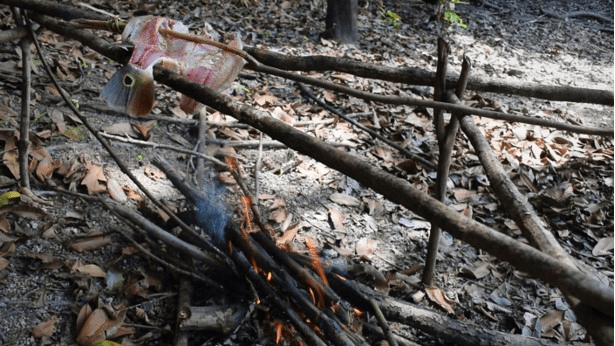
Good heat, good smoke, soon to be a good meal.
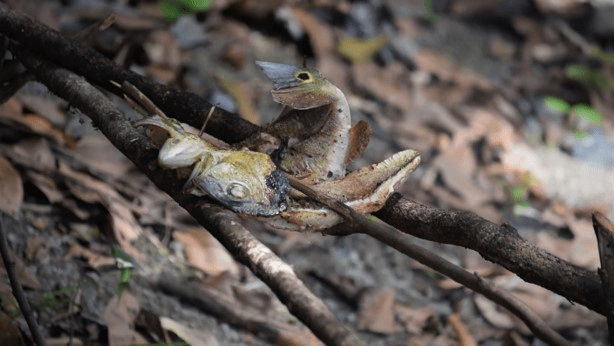
Eye is white- meat is done
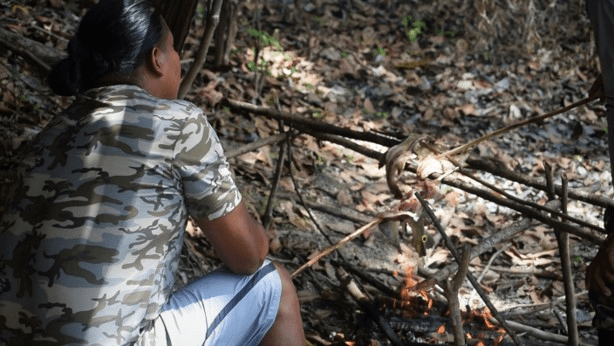
Terry minds the fire and prepares to serve up lunch.
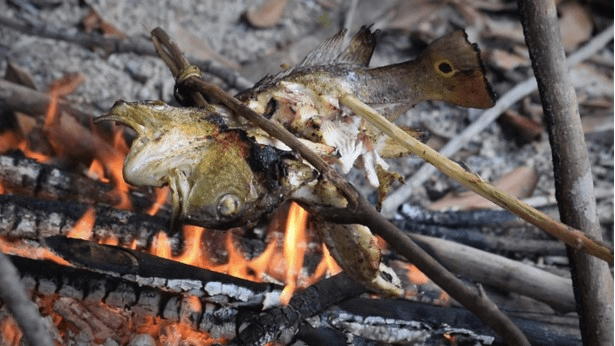
Delicious!
Here’s why I thoroughly enjoyed the experience of keeping the catch:
1. It placed a different kind of urgency on the act of fishing. We had to fish hard and smart to ensure we could fill our bellies/prevent starvation. That little cloud; that creeping anxiety tapped into something primordial – an ever-present need to ensure my well-being/survival and catching fish was the key. It’s an intensity that’s tough to relate to unless you try it.
2. Fighting, landing, and holding the fish took on a completely new vibe. A lost fish was a lost meal. If you won the battle and were able to land the fish, the animal itself took on a different character when you looked at it. I found myself feeling thankful for the experience and thankful to the fish for the sustenance it would provide. It’s nourishment would enable us to continue to PARTICIPATE in our environment/ecosystem. It was a different kind of connection than just being a tourist in a foreign place enjoying the scenery above and below water.
3. Those who know me know I experience gastro-intestinal issues. It’s nothing gross but I’m not going to go there. After eating fish and other Guyanese wildlife for 2 weeks, we felt fantastic (I caught a small bug at the end but that had nothing to do with the food). I haven’t polled the guys that went on the trip with me but I’m willing to bet all of us are trying to maintain our new fighting weights and our significant others and enjoying the benefits.
4. Eating our catch by a campfire, off a “bed of leaves” plate, with our fingers, sitting next to our Amerindian guides, was about as close to primitive bonding as I’ve ever experienced. There was no need to exchange a ton of words or fill the silence between chewing with conversation. Whether there were 3 of us or the entire group, we often sat silently – in the moment – taking it all in.
What’s My New Position?
By living off the land, we formed a connection to the environment, the fishery, and the fish in a way none of us had experienced before. This was a priceless aspect of our trip. It definitely made me appreciate my surroundings in a way I never had before. It also helped me understand why so many anglers and would-be anglers think it’s a little insane to catch a fish and release it.
That Hank Patterson video when he tries to explain catch and release fishing to a few bait anglers messes with me til this day. I cherish the moments when someone challenges my way of thinking and that video did just that (click here to check it out). I am no closer to a firm opinion on catch and release angling practices now vs. before I left for Guyana. In fact, I’m probably less sure now. What I do know now is that the topic poses a series of questions worth asking yourself and exploring from both sides. It’s a journey well worth taking before making a judgement of your own.

